Why Mexico’s president is promoting a recall against himself
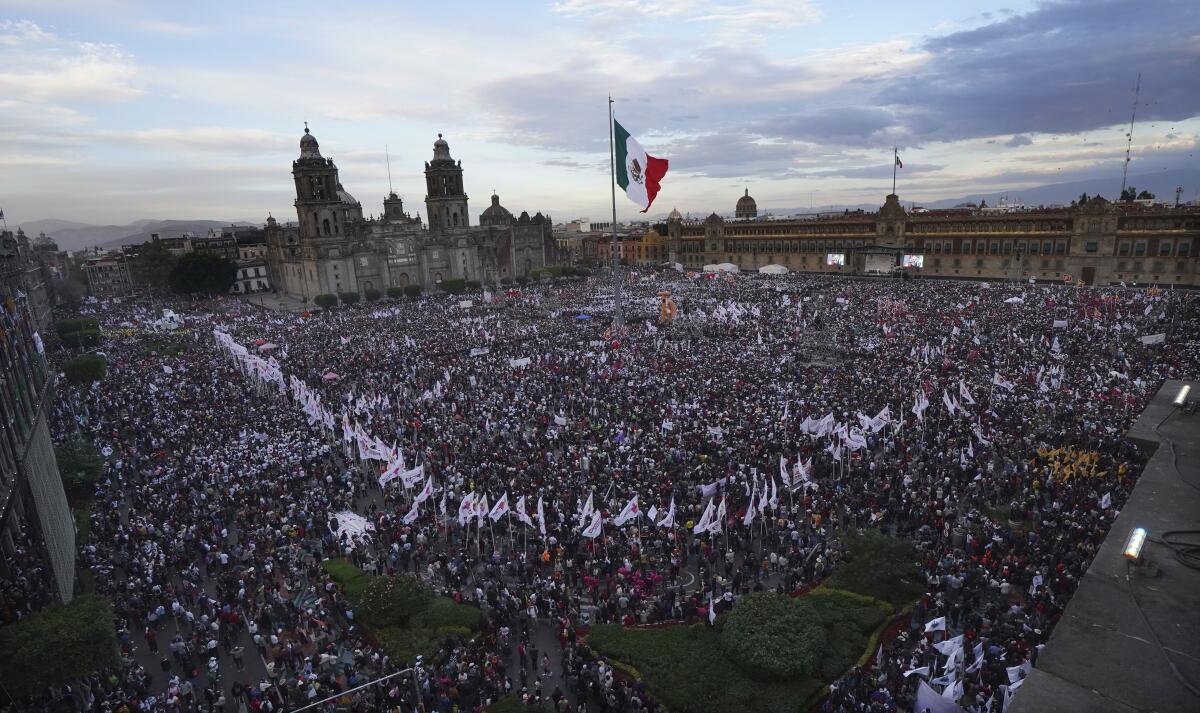
MEXICO CITY — Standing before hundreds of thousands of cheering supporters in downtown Mexico City’s central square, President Andrés Manuel López Obrador saved his most striking comment for the end of his speech.
He urged the Mexicans packed into the Zócalo to participate in an April referendum to decide whether they want to boot him from office more than two years early.
“None of, ‘They chose me for six years and I can do whatever I want,’” López Obrador said at the rally Wednesday to mark his midterm. “If one who governs is not up to the task and obeying the people, revoke their mandate and out!”
The president, 68, likely believes he has nothing to worry about.
Recent polls show that about two-thirds of the public approve of his performance since he took in 2018 on a platform that promised a radical transformation of Mexican society to combat corruption and inequality and to roll back free-market economic policies.
Families and marching bands making their way to the Zócalo passed vendors hawking gray-haired López Obrador dolls and posters with the hashtag #QueSigaAMLO, or “may AMLO continue,” referring to the president by his initials. Many said they view a referendum, authorized by a 2019 constitutional reform spearheaded by the president, as proof of his honest character when compared with decades of presidents accused of corruption.
“AMLO is the first president that dares to put himself to the test before the people,” said Debanhi Andrea Garcia, 22, who drove 14 hours from the state of Nuevo León with her boyfriend. “Because he’s like that, we support him.”
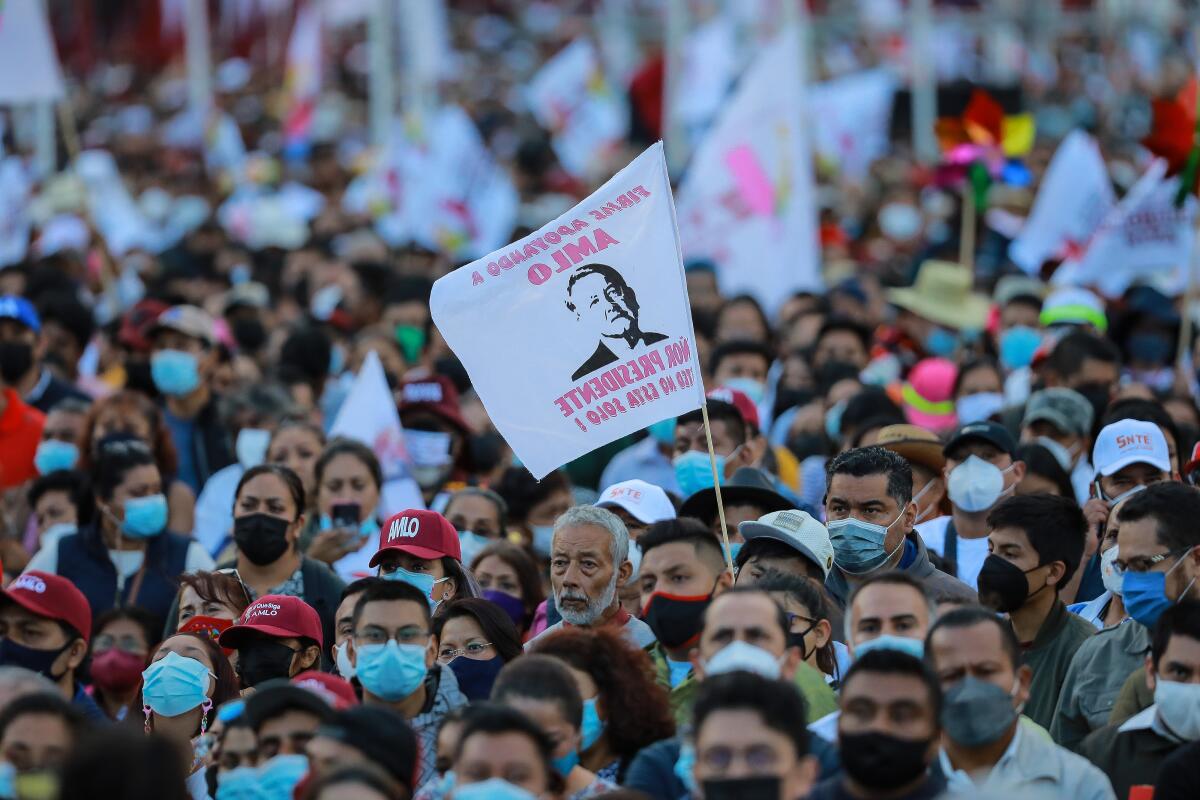
Mexicans have until Dec. 25 to sign a petition supporting the referendum, which can move forward only with the signatures of at least 3% of eligible voters, among other caveats.
So far, the initiative has received more than 703,000 signatures from Mexicans who have valid voting credentials, or 25% of the required total, according to the National Electoral Institute, an independent agency overseeing the process. (That tally includes signatures that will be discarded because they are duplicates or have other irregularities.)
Officially called the “revocation of mandate,” the measure follows other efforts by the president to increase citizen engagement in public policy. López Obrador has also backed referendums to decide whether former Mexican presidents should be prosecuted for alleged crimes, on the construction of a new airport near Mexico City and on the development of a tourism train line that would run through the Yucatan Peninsula.
“He does conceive his power as being a function of people reiterating their support actively,” said Francisco González, a professor of Latin American politics at Johns Hopkins University. “He wants it officially confirmed to give him that comfort of being the popular leader who is doing the right thing for Mexico.”
Since taking office, López Obrador has also expanded social welfare programs while introducing sharp austerity measures. He has halted renewable energy projects, promoted a constitutional reform to increase the country’s control of the electricity market, and given more power to the military — putting it in charge of projects such as the tourism train.
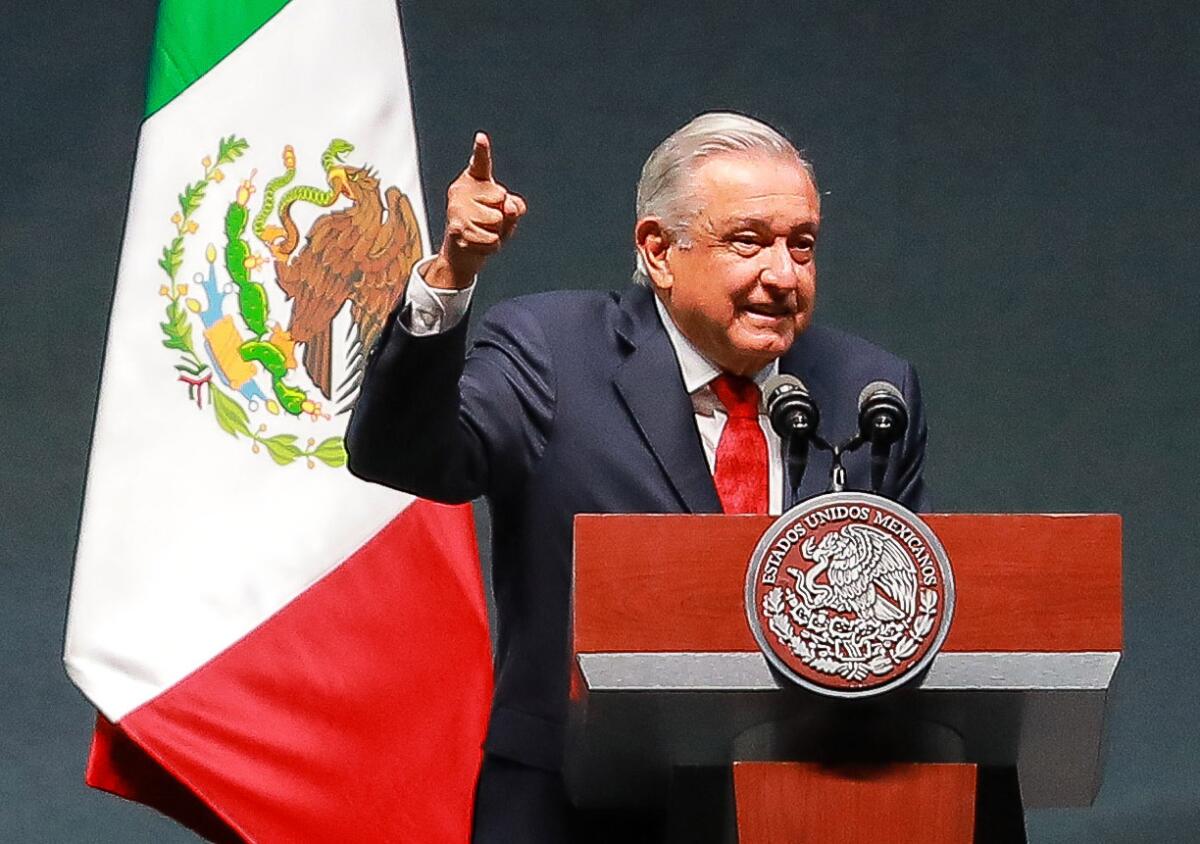
His critics say that he hasn’t done enough to reduce high numbers of homicides, including many killings of women and attacks against journalists and public officials. Dozens of candidates across the country were assassinated ahead of last spring’s midterm elections for governorships and legislative and mayoral seats.
Critics also are concerned about López Obrador’s condemnation of democratic agencies that could check his power, notably the National Electoral Institute. He has repeatedly disparaged the independent agency, which last May sanctioned him for making statements in at least 29 news conferences that it said could be considered government propaganda that could influence the midterm elections. In Mexico, such statements by public officials are generally barred during the election season.
But the president’s vision of transformational change continues to resonate among many voters who view him as a paternal figure. López Obrador is in constant dialogue with his electorate, holding press conferences every morning that last hours.
“The figure he has constructed of an honest man, an honorable man, an incorruptible man — that helps him in a society that is used to seeing terribly corrupt politicians,” said René Torres-Ruiz, a political scientist at the Ibero-American University in Mexico City.
Even if enough signatures are gathered, hurdles to a referendum remain. The National Electoral Institute’s members have said that the agency doesn’t have the budget to carry out the vote and at least 40% of eligible voters must participate for the referendum to be binding. The referendum on former presidents last August fell far short of the 40% voting figure.
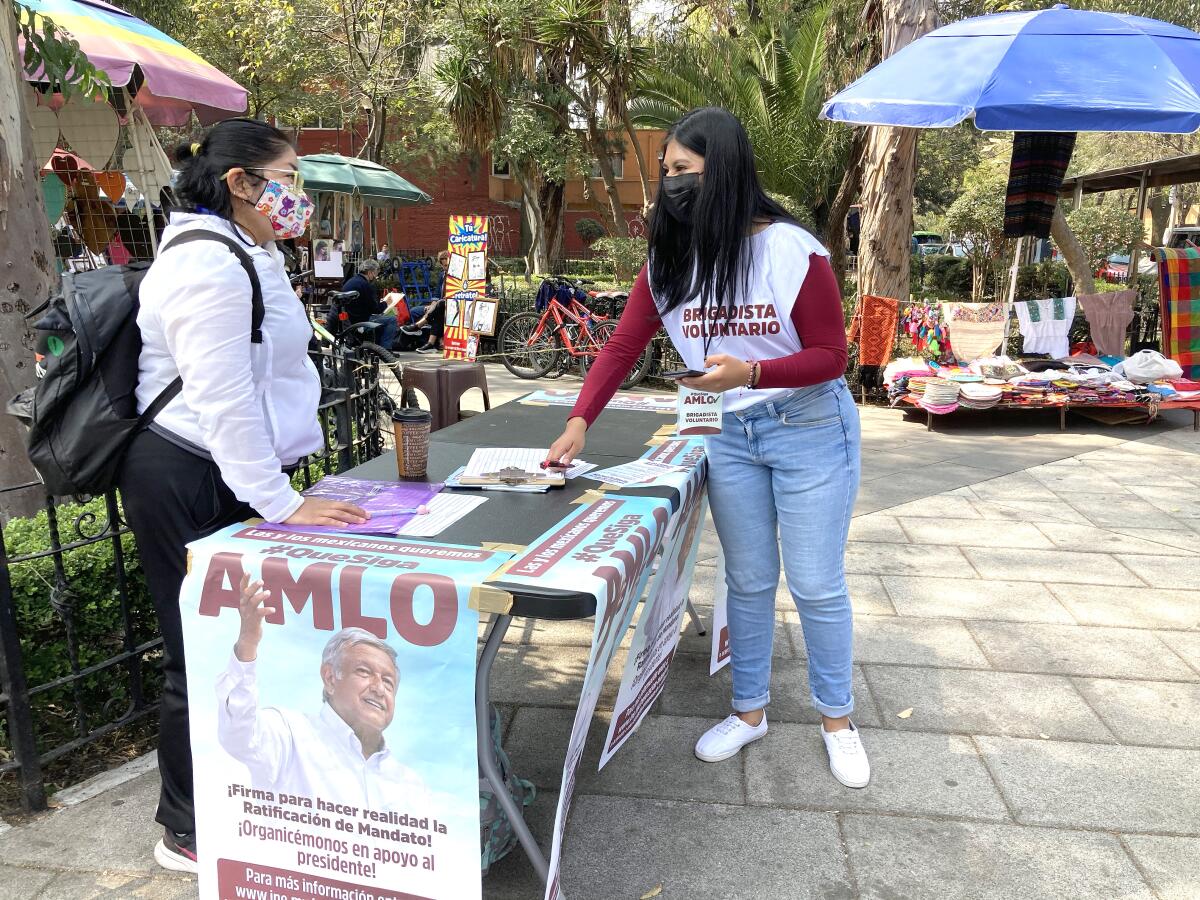
Stephanie Brewer, the director for Mexico and migrant rights at the D.C.-based Washington Office on Latin America, said that winning a referendum would increase López Obrador’s perception that he could move forward freely with his agenda.
“What he wants is to come out of the vote, supposing there is one, politically strengthened with this renewed and amplified popular mandate,” she said.
Opposition parties have accused the president’s supporters of twisting the stated purpose of the referendum into a tool to promote López Obrador’s agenda. The 2019 reform called for a referendum to “revoke” a president’s mandate rather than “ratify” it and a complaint before the National Electoral Institute by the National Action Party referenced how volunteers have registered voters next to posters that advertise the referendum as a means of promoting the president rather than recalling him from office.
Luis Cházaro, a congressman from the Party of the Democratic Revolution, told The Times that the referendum “has been transformed into a promotional tool for the party.” He does not plan to participate.
In Coyoacán, a cobblestoned neighborhood in Mexico City known for Frida Kahlo’s home, volunteers last Sunday gathered signatures at a plaza in front of posters of the president that said “may AMLO continue.”
Ariana Garcia, a 24-year-old volunteer, said she uses the term “ratification” for people she senses like the president and “revocation” for those she thinks oppose him.
“People tell you, ‘But I don’t want my president to leave,’ so we tell them, ‘OK, then in this case you can ratify your support for the president,’” she said.
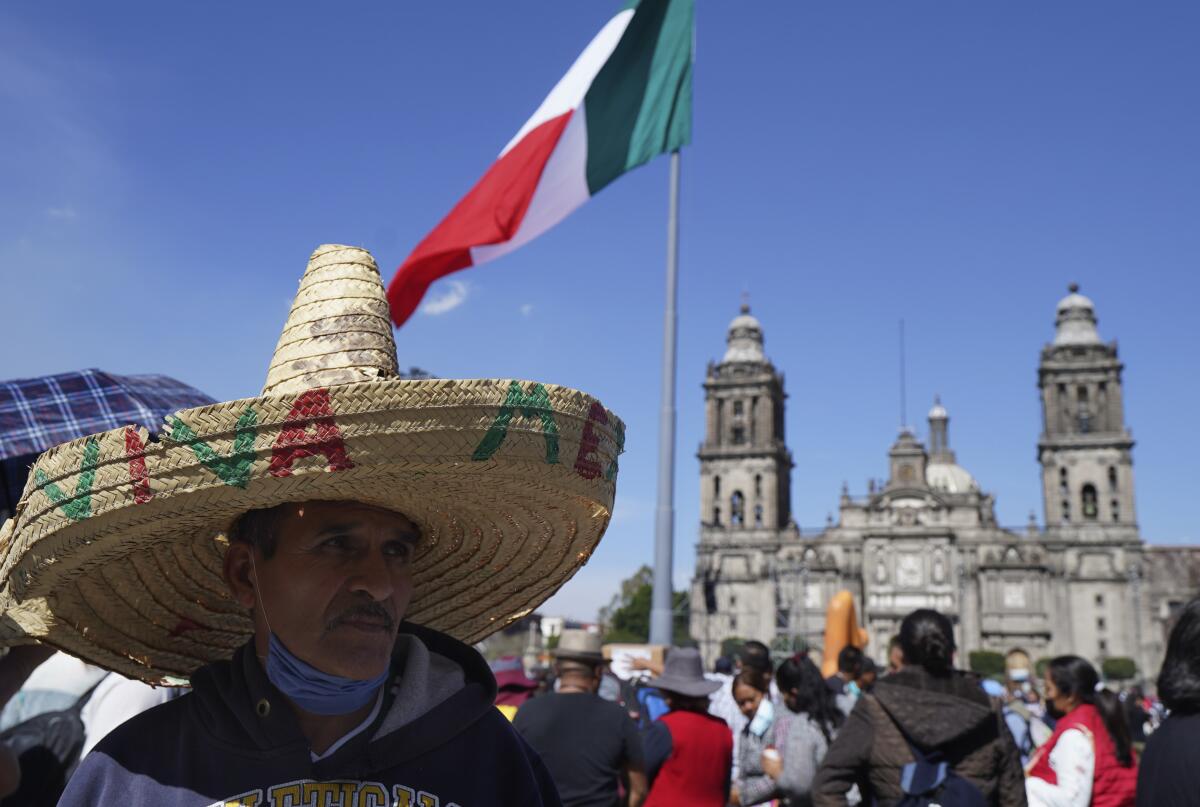
Roberto Garcia, a systems engineer in Mexico City, said that he would vote against the president, uncomfortable that the federal government recently issued a decree that requires federal agencies to automatically approve infrastructure projects that are deemed to be of interest to the public or national security. He also sees the referendum as “a type of manipulation,” suspicious of why the president has contradicted the National Electoral Institute, saying it has enough funding to hold a vote he himself has fought for.
María de los Angeles Resendiz, a grandmother of 10 from the state of Mexico, will support López Obrador without hesitation.
Resendiz, 62, watches the president’s 7 a.m. news conferences each day with her husband while preparing breakfast and washing dishes. If she needs to skip one, she’ll track it down later on YouTube. She also listens to summaries in case she’s missed something.
Before López Obrador took power, Resendiz tried to stay as far away from politics as she could. She became disillusioned when she was a little girl after the 1968 Tlatelolco massacre, in which soldiers killed as many as 300 people at a student protest in Mexico City.
She called López Obrador a “simple” man who has won her confidence with his anti-corruption platform. She eagerly described how his government has set money aside for youth job training and expanded welfare payments to the elderly.
“He’s given us back our dignity,” she said. “I am proud to say that I am Mexican and that he is my president.”
More to Read
Sign up for Essential California
The most important California stories and recommendations in your inbox every morning.
You may occasionally receive promotional content from the Los Angeles Times.











